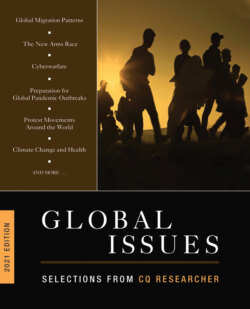Читать книгу Global Issues 2021 Edition - Группа авторов - Страница 38
На сайте Литреса книга снята с продажи.
Current Situation Escalating Standoff
ОглавлениеWashington and Tehran are now locked in an escalating standoff that could explode into a major Middle East war unless the two sides can reach a diplomatic solution, warn many former officials and regional experts. But the chances of negotiations taking place anytime soon seem remote.
For now, both countries, as well as Iran’s rival Saudi Arabia, have stepped back from the brink, sobered by September’s suspected Iranian attack against Saudi oil facilities. But Trump’s overall strategy of strangling Iran’s economy remains in place, as has Tehran’s unyielding resistance. If those policies persist, a military confrontation is more likely than not, observers say.
“That’s why we’ve got to be very, very careful,” says former Ambassador Crocker. “The law of unintended consequences is always in force in the Middle East.”
In early 2019, Iran hoped the Europeans would maintain the economic investments and other benefits promised by the nuclear deal and also sought to gain leverage by gradually reviving its nuclear program, in deliberate violation of the 2015 accord. The breaches could be reversed if the Europeans came through, Tehran said. But the U.S. sanctions proved too intimidating for the Europeans to move ahead with the plan for a special trade-financing mechanism using barter instead of U.S. dollars.
U.S.-Iran tensions have intensified significantly since April, when the Trump administration refused to renew waivers that allowed eight countries to continue buying Iranian oil.57 The waivers had gone to Tehran’s biggest customers—including China, India and Japan—whose oil purchases had helped insulate Iran’s economy from the sanctions. With the cancellation of those waivers, the administration signaled its intention to shut down Iran’s oil sector and maximize Iran’s pain.
“We’re going to zero across the board,” said Pompeo as he announced the end of the waivers. “How long we remain there … depends solely on the Islamic Republic of Iran’s senior leaders.”58
Despite a subsequent plunge in Iran’s oil sales and severe economic hardship for ordinary Iranians, the sanctions have had no apparent effect on Tehran’s national security policies, according to Iran experts. “On the contrary, instead of Iranians backing down, coming to the negotiating table and begging on their knees for mercy, they have counter-escalated in almost every area of contention with the United States,” says Iran expert Parsi.
Following Trump’s withdrawal from the JCPOA last year, Tehran has gradually breached restrictions on Iran’s nuclear program in an effort to pressure the accord’s European signatories to come up with the JCPOA’s promised economic benefits. In the most recent breach, President Hassan Rouhani said in November that Iran would accelerate its nuclear enrichment activities by injecting uranium gas into centrifuges at its underground Fordow facility. Under the JCPOA, Iran agreed to halt nuclear enrichment at that facility and use it for research. Meanwhile, Iran said it added dozens of advanced centrifuges to its uranium enrichment efforts, shortening the time needed to produce enough highly-enriched nuclear fuel for a bomb.59
Iran experts say Tehran also continues to support its Middle East proxies, as evidenced by the Sept. 14 drone-and-cruise-missile attack on Saudi oil facilities and Iran’s recent moves to enhance the range and accuracy of missiles it has given Hezbollah, the Houthis and the Iraqi Shiite militias. “Even in the worst of times economically, those efforts are not underfunded,” says Crocker. With an unpredictable Trump at the helm of U.S. forces, he adds, “national security remains Iran’s paramount priority.”
Trump’s October announcement that he was implementing his decision last year to withdraw U.S. troops from Syria has created yet another political vacuum for Iran’s Shiite proxies to fill, say Arab affairs analysts. Obama had deployed around 2,000 U.S. special operations forces to northeast Syria in 2014 to help Kurdish forces fight the Islamic State. The U.S. pullback will give the Iranians “the operational space to expand their growing network of Shiite foreign fighters, who can be mobilized and moved throughout the Middle East,” the RAND Corp.’s Tabatabai and her colleague Colin P. Clarke said after Trump first announced the Syria withdrawal last year.60
